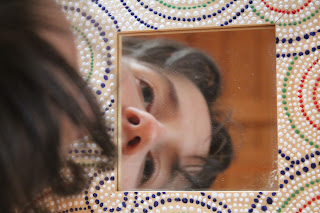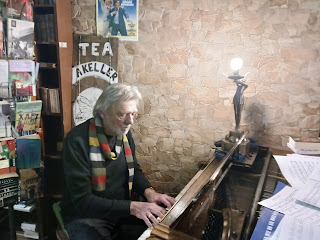Anna-Maria - Sensitivity and idealism
I first get to know Anna-Maria, the protagonist of this text, verbally through my brother Stefan before I see her for the first time. The two of them have spent a lot of time together in recent months and Anna-Maria has also visited our home a few times. However, only my brother knows her own home in the Waldviertel region. The young woman lives on a family farm with around 28 people, which includes various companies, a school and a farm. The PAN project was founded in 1995 and is the oldest community in Austria. The members live a Christian life and are almost exclusively self-sufficient. The community building, which Anna-Maria regards as her childhood home, smells of freshly baked bread every week. She also associates her home with the smell of a barn, as animals are kept here and she makes sure the chickens have everything they need, for example. (She is worried about the hawk.) The special way of life in the community gives Anna-Maria a sense of security, as they can feed themselves and live independently by producing their own food.
In this environment, Anna-Maria grew up close to nature and with many other children around her; she describes her childhood as varied.
Although she never went for walks with dolls as a little girl, Anna-Maria is sure that her strong desire to have children has always been there. Children, she tells me, are currently the only thing missing from her happiness in life. She says she has "always been babysitter number one" in her home since she was 10 years old. Even at 15, Anna-Maria was convinced that she would be able to take full responsibility for a child herself.
Today, the young woman leads a varied life, works as a childcare worker at the school that is part of the PAN project, enjoys singing and playing the piano. Anna-Maria is also involved as a doula. This term comes from the Greek and refers to a woman without medical training who accompanies expectant parents and ensures a pleasant time during pregnancy, birth and the postpartum period. As part of this role, she works as a birth partner for the Association of Doulas in Upper Austria. This association provides on-call support for parents for up to four weeks, with several doulas sharing an on-call service to make organization easier. In addition, my brother's partner has developed baby models that represent unborn babies in 7 different stages of development in their original size and weight and are sold to schools as teaching material (e.g. for gynecologists).
Although Anna-Maria loves her home more than anything, her heart is not only at home in Austria. In 2018, she was an au pair in Canada and got to know her host family, with whom she is still in contact today. Her host dad taught her how to make maple syrup and Anna-Maria was able to successfully win this in Austria. Anna-Maria also has relatives in Canada who she first saw as a child before her time abroad. She felt a connection to these people, visited this part of her family a year after her stay abroad and traveled through Canada with her mother. In addition to her time in North America, she also remembers a trip to Jordan with a smile on her face, where she visited the rock city of Petra, among other places.
Education and identity have played a major role in Anna-Maria's life. She tells me that she was not a stereotypical girl as a child, although she enjoyed doing handicrafts such as silk painting, macramé, crocheting or embroidery, cooking and looking after children, activities that are traditionally attributed to women. However, Anna-Maria never wanted to wear dresses and was also passionate about playing soccer. She didn't want to be a girl for a while out of frustration, but the thought of one day being a mother built her up.
The young woman loves children above all because they are fundamentally honest, make you laugh and radiate a zest for life and learning every day. Making time for each other and especially for children is therefore very important to Anna-Maria.
In general, my interviewee is a very communal person, she likes to remember parallel worlds that she used to create with other children using mirrors and in which they could lose themselves. In order to characterize Anna-Maria, it is also important to mention that she is a very frugal person. When I asked her what she would eat exclusively for the rest of her life, she answered pragmatically: "Bread and water, I could survive on that for a long time." Anna-Maria says that she is able to teach herself everything she needs or seeks out people she can learn from. She has learned and developed a lot on her own and still enjoys learning new things to this day.
She tells us all that communication deficits can lead to many unplanned misunderstandings and make life unnecessarily complicated. Anna-Maria always tries to start from the positive side of the other person, to put herself in their shoes and to understand them. A mindful and loving approach to ourselves, others and nature is always important, which is why she wants to be the best version of herself and, for example, collects garbage on the street that others have left lying around. This anecdote connects us, as I had the same habit during my time in the USA.





Kommentare
Kommentar veröffentlichen